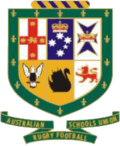Australian Schoolboys rugby union team
 | ||
| Union | Australian Schools Rugby Union | |
|---|---|---|
| Founded |
1969 (affiliate member of ARU) | |
| ||
| Official website | ||
|
www | ||
The Australian Schoolboys rugby union team is the national team for schoolboy rugby union players in Australia. Considered to be the pinnacle of schoolboy rugby in Australia, the team plays in fixtures against other national representative schoolboy teams from around the world. Many players who have played in the Australian Schoolboys team have gone on to further representative careers with Super Rugby franchise teams and the Australian national rugby union team.[1]
Australian Schools Rugby Championships
The Australian Schools Rugby Championships, held to determine the champion state and to select the Australian Schools Rugby team, have taken place every year since 1973.[2] Under the current format, the championships are played in two divisions.
Division I
| Division I Championships (from 1999 onwards)[3] | |||
| Year | Winner | Runner-up | Location |
|---|---|---|---|
| 2015 | NSW I | QLD I | Sydney |
| 2014 | NSW I | NSW II | Sydney |
| 2013 | NSW I | NSW II | Sydney |
| 2012 | NSW I | QLD I | Sydney |
| 2011 | QLD I | NSW I | Brisbane |
| 2010 | QLD II | NSW II | Brisbane |
| 2009 | QLD I | Comb. States | Sydney |
| 2008 | QLD I | NSW I | Canberra |
| 2007 | QLD I | NSW II | Canberra |
| 2006 | QLD II | NSW II | Sydney |
| 2005 | NSW I | QLD I | Canberra |
| 2004 | NSW I | QLD I | Sydney |
| 2003 | QLD I | NSW I | Brisbane |
| 2002 | NSW I | NSW II | Sydney |
| 2001 | QLD I | NSW I | Darwin |
| 2000 | NSW I | ACT | Brisbane |
| 1999 | NSW I | ACT | Melbourne |
The Division I Championship is contested by 8 teams:[2]
- QLD I and QLD II
- NSW I and NSW II
- ACT
- VIC I
- WA
- Combined States
Each team has a squad of 23 players. The "Combined States" team is composed of players from any state (or territory) not selected for other squads but deemed up to the standard required for Division I. The team winning the Division I Championship is awarded the 'Jika' Travers Shield, while the runner-up receives the 'Weary' Dunlop Plate.[2]
Following the tournament, the Australian Schools Team is selected to represent Australia in 'Test' matches against national Under 18 or schoolboys teams from other countries.[2]
An Australian Schools Barbarians team (previously Australia A Schoolboys) is also chosen. This side was first selected in 1995 and also plays schoolboys teams from other countries, but these matches (usually on Australian soil against incoming teams) are not counted as Australian Schools 'Test' matches.[3]
Division II
The Division II Championship is contested by 4 teams:[2]
- National Indigenous[4]
- South Australia
- Tasmania
- Northern Territory
In previous years, the first teams from Victoria and Western Australia played in Division II but they now play in Division I. For the 2014 tournament, Victoria II replaced Tasmania in the Division II Championship,[5] but Tasmania returned in 2015. The team winning the Division II Championship is awarded the Charles Blunt Cup, while the runner-up receives the Merv Allen Plate.[2]
Since 2012, a President’s XV Team has been selected from the Division II players for matches against visiting national schools teams.
Players with most Schoolboy caps
- Chris Feauai-Sautia - 11
- Hugh Roach - 11
- Curtis Browning - 10
- Quade Cooper - 9
- Kurtley Beale - 9
- Tepai Moeroa - 9
- Andrew Barrett - 9
See also
References
- ↑ "Australian Schoolboys". Australian Rugby Union. Archived from the original on 14 September 2009. Retrieved 2009-09-23.
- 1 2 3 4 5 6 "ASRU Championships 2011". Australian Schools Rugby News August 2011. Retrieved 2012-06-29. pp.1-10
- 1 2 "Results of ASRU Championships". Australian Schools Rugby Union. Archived from the original on 29 Jun 2012. Retrieved 2012-06-29.
- ↑ "Lloyd McDermott Indigenous Rugby Union Program". rugby.com.au. Archived from the original on 19 Jul 2011. Retrieved 2012-06-30.
- ↑ "Sebel ASRU Championships 2014 Draw". Australian Schools Rugby Union. Archived from the original on 29 June 2014. Retrieved 29 June 2014.
External links
| ||||||||||||||||||||||||||||||||||||||||||||||||||||||||||||||||||||||||||
| ||||||||||